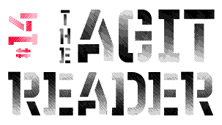
Sexy Intellectual
There’s much that can be said of Kraftwerk in terms of their perhaps ever-expanding sphere of influence. If one considers the hip-hop, techno, electronica, ambient, and of course, rock artists they’ve influenced—and in turn the artists those artists have influenced—the German band’s touch is continually exponential. Before their time, as well as that of many others yet to come, Kraftwerk were at the forefront of electronic experimentation in the ‘60s (when Kraftwerk principals Florian Schneider and Ralf Hütter were in a group called the Organisation) and ‘70s, as well as the flourishing scene in Germany. They blended organic instrumentation with homemade implements until technology started catching up with them while similarly pushing the envelope until popular music too got up to speed. “Autobahn,” “Radio Activity” and “Trans-Europe Express” remain classics, while the band’s cumulative oeuvre seems contemporary as ever today.
While not an “authorized” biography, Kraftwerk and the Electronic Revolution is about as thorough a look at the band as one could hope. At three hours in running time, the DVD documentary covers a vast amount of territory. Indeed, the video is close to an hour in before even getting to the formation of the band from the splinters of the Organisation. As such, it does an exceedingly exceptional job of placing Kraftwerk in the context of their origination. What was eventually called Krautrock is explored in depth, with great video from the Zodiac club and well-known contemporaries like Can, Tangerine Dream, Neu! and Amon Dull as well as lesser-knowns like Popol Vuh, not to mention Kraftwerk themselves. In addition, the classical strain of electronic music initiated by artists like Karlheinz Stockhausen is more than just touched upon. The doc also gets to those persons, like Brian Eno and David Bowie, who were directly influenced by Kraftwerk, so really no stone is left unturned.
Interviews with artists and critics help elucidate the importance of Kraftwerk, as well as the band’s development. The best of these come from former members, with the talks with Karl Bartos being particularly illuminating. The film eventually traces the band’s influence to new wave artists like Soft Cell, Simple Minds and Gary Numan and hip-hop masterminds like Afrika Bambaataa, but then ends abruptly soon there after, not really getting to the band’s fluctuating activity during the last decade. Still the only things the DVD is missing are interviews with Schneider and Hütter, but then they probably couldn’t say anything about the band that isn’t already said.Stephen Slaybaugh
Alice Cooper Live Review
The Shoegaze Top 10
Digital Downloads Round-Up
Live Reviews of Radiohead and Bon Iver
Joe Strummer: The Future Is Unwritten
An Agit Writer at the Pitchfork Festival
Daft Punk's Electroma
R.I.P. Noel Sayre
Heavy Metal in Baghdad
The Agit Report from Terrastock 7
News: Lollapalooza, Patti Smith Film, and Apples in Stereo and Son, Ambulance Tours
News: New Walkmen Album, InterZune, and Yeah Yeah Yeahs Recording
